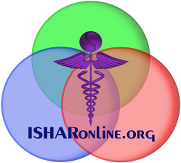Naturopathy
List ISHAR Online Sources: Naturopathy
Functional Summary
|
Modality |
|
Wide spectrum including dietary changes, supplements, herbal medicine, homeopathy, massage, and exercise. |
|
Intention |
|
Improve health, prevent disease, and treat illness via healthy food and exercise, and treatments from a variety of other forms of complementary medicine. |
|
Geo-Cultural |
|
German roots. Further developed in the United States in the 19th Century. |
Topic Summary
The term “naturopathy” was created in 1895 and sold to Benedict Lust, the “father of U.S. naturopathy.” Lust was trained in Germany in various natural health practices before going to the U.S. to spread these ideas and techniques. Lust believed the body consisted of spiritual and cosmic forces which could be relied upon for healing.
Naturopathy’s popularity grew quickly in the US after its introduction. Soon, schools, and societies, and laws were developed to spread and regulate licensed naturopathic doctors. Despite this boom, naturopathy fell out of favor through the mid-20th century, especially as modern medicine was developed and brought with it such “miracle drugs” as penicillin. The holistic movement of the 1970s brought naturopathy back to popularity.
Naturopaths primarily believe in the body’s ability to heal itself through vital energy, therefore, surgery and drugs are avoided, though some naturopathic physicians may prescribe drugs or perform minor surgeries. Many naturopaths are also against vaccinations.
In general, naturopathy encompasses a wide array of other practices, the most common therapies prescribed being botanical medicines, vitamins, minerals, homeopathy, and allergy treatments.
Research Summary
Despite its renewed popularity since the 1970s, naturopathy has received mixed reviews from medical academia. In 1981, one paper concluded that such alternative medicines were not justified because there was minimal proof as to their efficacy and they took undue risks which could be avoided in traditional medicine. However, in 2008, additional research indicated that naturopathic treatment should be investigated further, as it showed promise in improvement of health for people with multiple-sclerosis. Research from a study published in 2014 argued that a naturopathic approach to the prevention of cardiovascular disease was more effective and less expensive than the usual care and biometric screening. Positive studies tend to look at naturopathy as a complement to accepted medical practices and treatments, not as a treatment unto itself.
Perspectives
ISHAR strives to present all of our data in an impartial, informative manner. Nonetheless, there are always different viewpoints on various topics, and ISHAR encourages users to review the perspectives on other informational sites, then come to their own conclusions regarding what they consider the least biased. The sites below were chosen to represent a wide spectrum of approaches to this topic, and none are endorsed or promoted by ISHAR itself.
- Wikipedia: http://en.wikipedia.org/wiki/Naturopathy
- WebMD: http://www.webmd.com/allergies/tc/naturopathic-medicine-topic-overview
- A Pro-Practice Website: http://www.naturopathydigest.com/
- An Anti-Practice Website: http://www.medscape.com/viewarticle/465994
